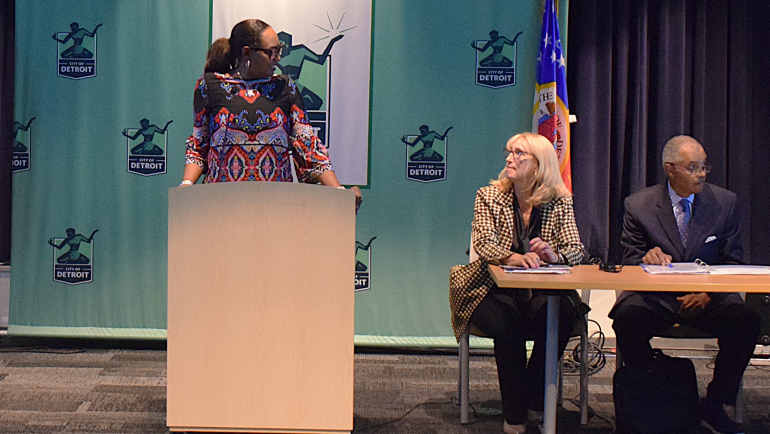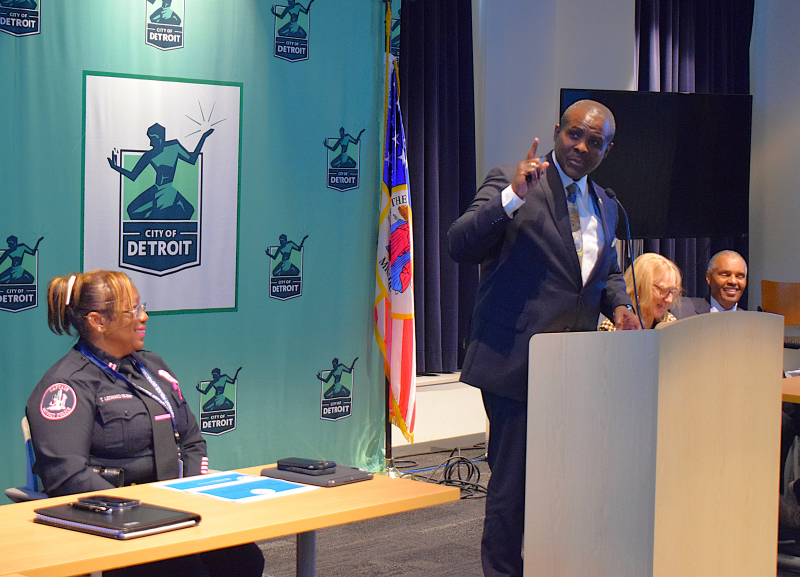Wayne County’s Behavioral Health Collaborative serves as a model for work across the country
This week in Detroit, a group of 25 civic leaders from Tulsa, Oklahoma, met with Wayne County community partners to discuss strategies for diverting individuals with behavioral health needs from the criminal justice system to community-based treatment. The meeting, organized by the Healthy Minds Policy Initiative, highlighted the successes of the Wayne County Behavioral Health Collaborative (WCBHC), a coalition of key local partners, providing Tulsa leaders with valuable insights and approaches they could adapt for their own community.
The WCBHC is the culmination of years-long efforts by the Wayne County Sheriff’s Office, Detroit Police Department, the Wayne County Probate Court, the Detroit Wayne Integrated Health Network, the Wayne County Commission, and Wayne State University School of Social Work. Actions of the collaborative have been facilitated by the Center for Behavioral Health and Justice (CBHJ) at the Wayne State University School of Social Work. The WCBHC strengthens the local behavioral health network, ensuring an inclusive and equitable approach to drive systemic change and improve outcomes for individuals and families across the county and is generously supported by the Ethel and James Flinn Foundation.
 “As engaged as we all are in this work, it’s really nice to know that our efforts might be replicated in other places across the country,” said Sheryl Kubiak, dean of the Wayne State University School of Social Work and director of the CBHJ. “We really believe in the work that we’re doing, and in teamwork, and in the results that we’ve seen.”
“As engaged as we all are in this work, it’s really nice to know that our efforts might be replicated in other places across the country,” said Sheryl Kubiak, dean of the Wayne State University School of Social Work and director of the CBHJ. “We really believe in the work that we’re doing, and in teamwork, and in the results that we’ve seen.”
A panel discussion featured members of the WCBHC executive committee. Moderated by Andrea Cole, CEO and president of the Ethel and James Flinn Foundation, presenters included: Dean Kubiak; Detroit Police Department Captain Tonya Leonard; Chief Robert Dunlap, jail administrator for the Wayne County Sheriff’s Office; and Chief Judge Freddie G. Burton, Jr., of the Wayne County Probate Court. Other members of the WCBHC executive committee include Chairwoman Alisha Bell of the Wayne County Commission and leadership from Detroit Wayne Integrated Health Network (DWIHN).
“Without the collaborative, we would not be where we are today,” said Captain Leonard. “Our co-response model at the Detroit Police Department is based on the work we’ve done together as we learn from each other and share information to build and implement new processes. We are very excited about what we’ve been able to accomplish in the city.”

Each of the speakers emphasized their gratitude for the opportunity to work collaboratively toward a common goal. The collective effort of the WCBHC has not only strengthened local interventions but also serves as a model that Tulsa leaders can adapt to suit the needs of their community.
“What we heard was a really impressive array of coordination happening around public safety and mental health in Detroit,” said Zack Stoycoff, Healthy Minds Policy Initiative executive director. “We’ve got some really great things going on in Tulsa that we’re proud of as well, but we look forward to taking these lessons home with us.”
Wayne State University's Prosperity Agenda, spearheaded by President Kimberly Andrews Espy, places a significant emphasis on public health as a cornerstone of the university's mission. By focusing on improving the health, well-being, and quality of life for individuals and families in Detroit and all of Wayne County, the work of the WCBHC aligns with the priorities of the Prosperity Agenda. Both initiatives prioritize community engagement, collaboration, and systemic change to empower the most vulnerable populations in urban neighborhoods in Wayne County, Detroit, and beyond.
About Healthy Minds Policy Initiative: Healthy Minds Policy Initiative helps policymakers and community leaders advance data-driven strategies to overcome our state's substance use challenges and meet the mental health needs of all Oklahomans. Learn more about Healthy Minds
About the Wayne County Behavioral Health Collaborative: The Wayne County Behavioral Health Collaborative (WCBHC) brings together key community partners (the Wayne County Sheriff’s Office, Detroit Police Department, Ethel and James Flinn Foundation, the Wayne County Probate Court Behavioral Health Unit, the Detroit Wayne Integrated Health Network, the Wayne County Commission, and the Center for Behavioral Health and Justice at the Wayne State University School of Social Work) to divert individuals with behavioral health needs from the criminal justice system to community-based treatment. Through collaboration, education, and open communication, the WCBHC strengthens the local behavioral health network, ensuring an inclusive and equitable approach to drive systemic change and improve outcomes for individuals and families across the county.
About the Center for Behavioral Health and Justice: The Center for Behavioral Health and Justice at the Wayne State University School of Social Work (CBHJ) serves as external facilitators of change who bridge the complex behavioral health / criminal legal intersection by fostering meaningful dialogue with community partners to advance solutions that promote effective community treatment across multiple settings. Learn more about the CBHJ